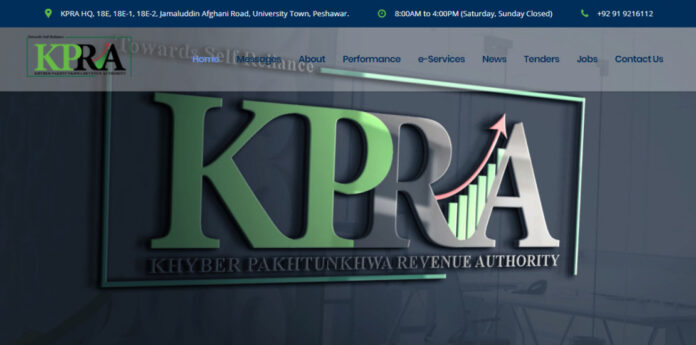PESHAWAR: With broadening of tax base by almost 800 per cent, the Khyber Pakhtunkhwa Revenue Authority (KPRA) has so far registered 11,000 potential taxpayers, starting from 1,185 three years ago.
According to the authority’s annual report, an average 400 new potential taxpayers are being registered each month.
The authority has taxed 94 services keeping in view the overall economic activities in the province and the annual revenue collection, which was fluctuating between Rs6-7 billion, is now crossing Rs15 billion.
The annual report further says in last fiscal year 2018-19 the authority got 94.6 per cent of its annual target despite a ban on the collection and payment of sales tax on services on telecom sector by the Supreme Court.
The apex court’s embargo on telecom sector from May 2018 till April 2019 caused 54pc decline in the collection.
Despite this unanticipated hit, the KPRA has collected Rs10.584 billion against target of Rs10.91 billion in 2018-19.
The authority collected Rs8.1 billion till December 2019 and it intends to cross Rs17 billion by the year end.
Sources in the authority say that the reasons behind slow pace in the past were frequent reshufflings in the top management and lack of specialized human resource trained in tax administration.
“We were even struggling to justify the very existence of KPRA as its contribution to the provincial tax revenue was not impressive,” said an official who did not want to be named.
Outgoing Director General of KPRA Tahir Orakzai told this scribe that he was posted in the authority in 2017 with big challenges of organizational development, annual revenue targets; and proliferation of sales tax on services in an environment where tax culture was not existent, rather hostile.
On the other hand, the KP government was facing with financial crunch as the federal government at that time was also politically opponent to Pervez Khattak’s administration in KP, he said, adding there was a need for additional provincial revenue for development spending.
“A quick diagnostic of the situation was completed and the first thing we did was to get in touch with the international organization working as partners with the KP government in capacity building of its entities. Experienced consultants for the organizational development and preparation of essential by-laws were hired and a competent team was onboard quickly.”
The team prepared a comprehensive plan for the organizational development that was aimed at shaping KPRA into an authority was presented to the Policy Council chaired by the KP chief minster and got approved in April 2017, Orakzai added.
He said the plan was implemented and organizational structure of the authority was erected with several Directorates and Collectorates.
Presently, the authority holds five Specialized Directorates, Collectorate of Revenue, Collectorate of Appeal and an Appellate Tribunal and three Zonal Offices in Mardan, Abbottabad and Bannu run by over 140 professionals. Over 30 sets of rules and regulations along with bylaws covering different aspects of the authority and its employees were framed.
“We worked on exploring non-telecom sectors as reliance on telecom sector was not only stagnant in terms of progress but was also vulnerable,” the senior official said, adding that the non-telecom revenue went up to almost Rs8 billion in the last fiscal year as the authority worked on exploring other sectors including hospitality, construction, beauty salons and Franchise services.
“We need to conceptualize, motivate and mobilize potential tax payers. We are working on it and we have developed an effective communication strategy to crack the trust deficit in the society making them believe the government departments as their own.”
The KPRA chief said the authority was striving to increase fiscal space for development projects in the province and its aim was to make KP fiscally self-reliant, adding developing tax culture in the province is still a challenge and needs a lot of efforts.




